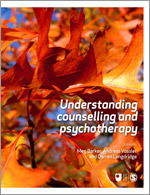Understanding Counselling and Psychotherapy
- Meg Barker - Independent Scholar, UK
- Andreas Vossler - The Open University
- Darren Langdridge - The Open University
Counselling and Psychotherapy (General)
- Section 1 introduces counselling and psychotherapy and the history of these professions, considering how current understandings of 'mental health problems' have been influenced by psychiatric diagnosis, biomedical approaches and psychoanalysis.
- Section 2 covers four key therapeutic approaches - humanistic, existential, cognitive-behavioural and mindfulness - exploring how they work with problems relating to fear and sadness.
- Section 3 focuses on therapeutic perspectives that specifically address problems in a wider context, such as relationships, families, cultural groups and society.
- Section 4 considers practice and research issues in counselling and psychotherapy, including the different contexts and settings in which these take place, the therapeutic relationship, and outcome and process research.
This accessible and stimulating text uses innovative activities and case illustrations to demonstrate how people experience common problems, and how counsellors and psychotherapists work with these.
I particularly liked the use of scenarios, and the illustrations. Offers a thorough coverage of material - would recommend with enthusiasm
I would recommend this book as one of the texts the students should read in relation to the course content

